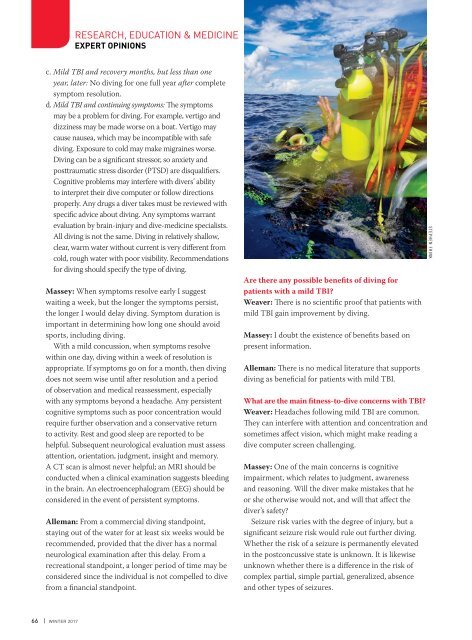AD 2017 Q1
Alert Diver is the dive industry’s leading publication. Featuring DAN’s core content of dive safety, research, education and medical information, each issue is a must-read reference, archived and shared by passionate scuba enthusiasts. In addition, Alert Diver showcases fascinating dive destinations and marine environmental topics through images from the world’s greatest underwater photographers and stories from the most experienced and eloquent dive journalists in the business.
Alert Diver is the dive industry’s leading publication. Featuring DAN’s core content of dive safety, research, education and medical information, each issue is a must-read reference, archived and shared by passionate scuba enthusiasts. In addition, Alert Diver showcases fascinating dive destinations and marine environmental topics through images from the world’s greatest underwater photographers and stories from the most experienced and eloquent dive journalists in the business.
You also want an ePaper? Increase the reach of your titles
YUMPU automatically turns print PDFs into web optimized ePapers that Google loves.
RESEARCH, EDUCATION & MEDICINE<br />
EXPERT OPINIONS<br />
c. Mild TBI and recovery months, but less than one<br />
year, later: No diving for one full year after complete<br />
symptom resolution.<br />
d. Mild TBI and continuing symptoms: The symptoms<br />
may be a problem for diving. For example, vertigo and<br />
dizziness may be made worse on a boat. Vertigo may<br />
cause nausea, which may be incompatible with safe<br />
diving. Exposure to cold may make migraines worse.<br />
Diving can be a significant stressor, so anxiety and<br />
posttraumatic stress disorder (PTSD) are disqualifiers.<br />
Cognitive problems may interfere with divers’ ability<br />
to interpret their dive computer or follow directions<br />
properly. Any drugs a diver takes must be reviewed with<br />
specific advice about diving. Any symptoms warrant<br />
evaluation by brain-injury and dive-medicine specialists.<br />
All diving is not the same. Diving in relatively shallow,<br />
clear, warm water without current is very different from<br />
cold, rough water with poor visibility. Recommendations<br />
for diving should specify the type of diving.<br />
Massey: When symptoms resolve early I suggest<br />
waiting a week, but the longer the symptoms persist,<br />
the longer I would delay diving. Symptom duration is<br />
important in determining how long one should avoid<br />
sports, including diving.<br />
With a mild concussion, when symptoms resolve<br />
within one day, diving within a week of resolution is<br />
appropriate. If symptoms go on for a month, then diving<br />
does not seem wise until after resolution and a period<br />
of observation and medical reassessment, especially<br />
with any symptoms beyond a headache. Any persistent<br />
cognitive symptoms such as poor concentration would<br />
require further observation and a conservative return<br />
to activity. Rest and good sleep are reported to be<br />
helpful. Subsequent neurological evaluation must assess<br />
attention, orientation, judgment, insight and memory.<br />
A CT scan is almost never helpful; an MRI should be<br />
conducted when a clinical examination suggests bleeding<br />
in the brain. An electroencephalogram (EEG) should be<br />
considered in the event of persistent symptoms.<br />
Alleman: From a commercial diving standpoint,<br />
staying out of the water for at least six weeks would be<br />
recommended, provided that the diver has a normal<br />
neurological examination after this delay. From a<br />
recreational standpoint, a longer period of time may be<br />
considered since the individual is not compelled to dive<br />
from a financial standpoint.<br />
Are there any possible benefits of diving for<br />
patients with a mild TBI?<br />
Weaver: There is no scientific proof that patients with<br />
mild TBI gain improvement by diving.<br />
Massey: I doubt the existence of benefits based on<br />
present information.<br />
Alleman: There is no medical literature that supports<br />
diving as beneficial for patients with mild TBI.<br />
What are the main fitness-to-dive concerns with TBI?<br />
Weaver: Headaches following mild TBI are common.<br />
They can interfere with attention and concentration and<br />
sometimes affect vision, which might make reading a<br />
dive computer screen challenging.<br />
Massey: One of the main concerns is cognitive<br />
impairment, which relates to judgment, awareness<br />
and reasoning. Will the diver make mistakes that he<br />
or she otherwise would not, and will that affect the<br />
diver’s safety?<br />
Seizure risk varies with the degree of injury, but a<br />
significant seizure risk would rule out further diving.<br />
Whether the risk of a seizure is permanently elevated<br />
in the postconcussive state is unknown. It is likewise<br />
unknown whether there is a difference in the risk of<br />
complex partial, simple partial, generalized, absence<br />
and other types of seizures.<br />
STEPHEN FRINK<br />
66 | WINTER <strong>2017</strong>









